How Engine Power and Transmission Types Affect Gas Mileage
This post utilises data from the CORGIS Dataset - Cars (2009–2012).
Fuel efficiency units are given in miles per gallon (MPG) per the dataset.
Conversion factor: 0.425 MPG ≈ 1 km/l.
Table of contents
Open Table of contents
1. Introduction
Thinking about buying a new vehicle?
You’re probably juggling between getting something that’s fun to drive and something that won’t break the bank at the pump. Fuel efficiency is a crucial factor in this decision. Getting more miles per gallon (MPG) as you drive, can mean fewer gas station stops and less pollution — a win for both you and the planet!
I’ve always thought that powerful engines use more gas and that manual vehicles are better for mileage than automatic ones. But does the data back this up? Let’s take a closer look and find out.
2. Data Exploration and Key Questions
An Overview of the Data
Okay, let’s dive into some numbers. Our dataset features 5,058 unique vehicle combinations, giving us a solid snapshot of various makes, model years, and performance metrics from 2009 to 2012. The timeframe lets us peek into trends over time in fuel efficiency and see how tech advancements might have shaken things up.
The top five brands in the dataset are:
Chevrolet: 624 modelsFord: 594 modelsGMC: 366 modelsToyota: 323 modelsNissan: 293 models
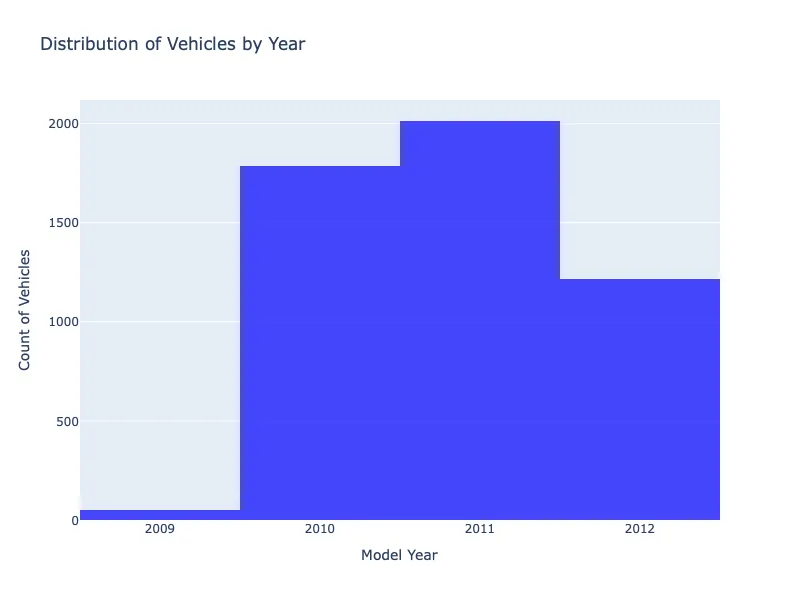
A histogram reveals a higher concentration of models closer to 2012, meaning we’ve got a greater number of newer vehicles in the dataset.
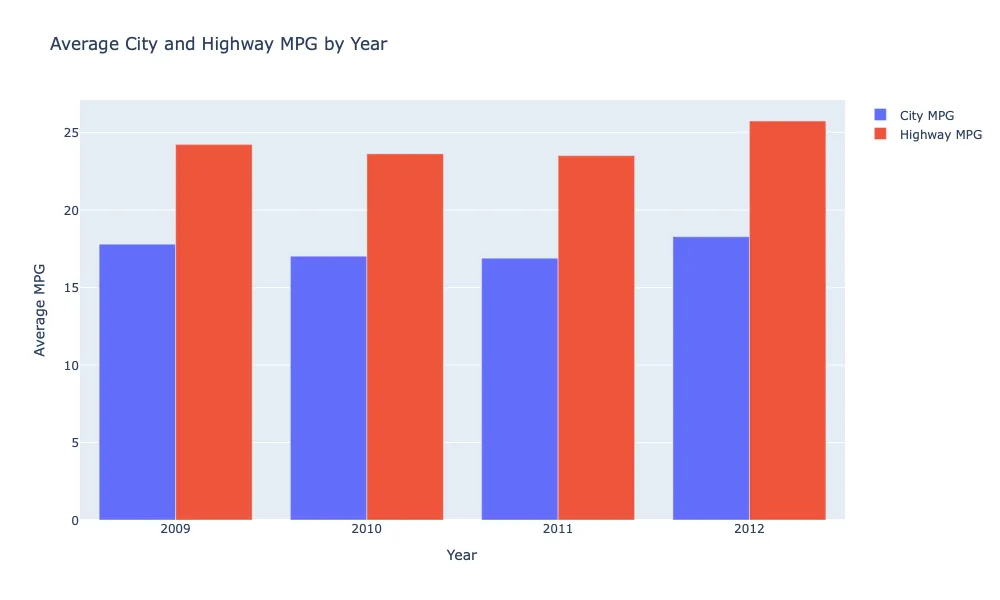
From 2009 to 2012, highway MPG consistently beat city MPG.
Without the stop-and-go of city traffic, highway driving is usually smoother and enhances fuel efficiency.
On average, vehicles in the dataset got about 17 MPG in the city and 24 MPG on the highway.
Key Questions to Explore
The dataset contains information on:
Performance metrics: Horsepower and Torque by modelTransmission type: Manual and Automatic Transmission categorisationFuel efficiency indicators: City and Highway MPG by model
Using the data, we’ll tackle the following questions in the next two sections:
- What roles do horsepower and torque play in predicting city and highway MPG?
- Can modern automatic transmissions match or exceed manual vehicles in real-world MPG performance?
3. Trade-Off Between Power and Fuel Efficiency?
Horsepower vs Fuel Efficiency
First up, let’s see if more horsepower usually predicts worse fuel efficiency.
City MPG:
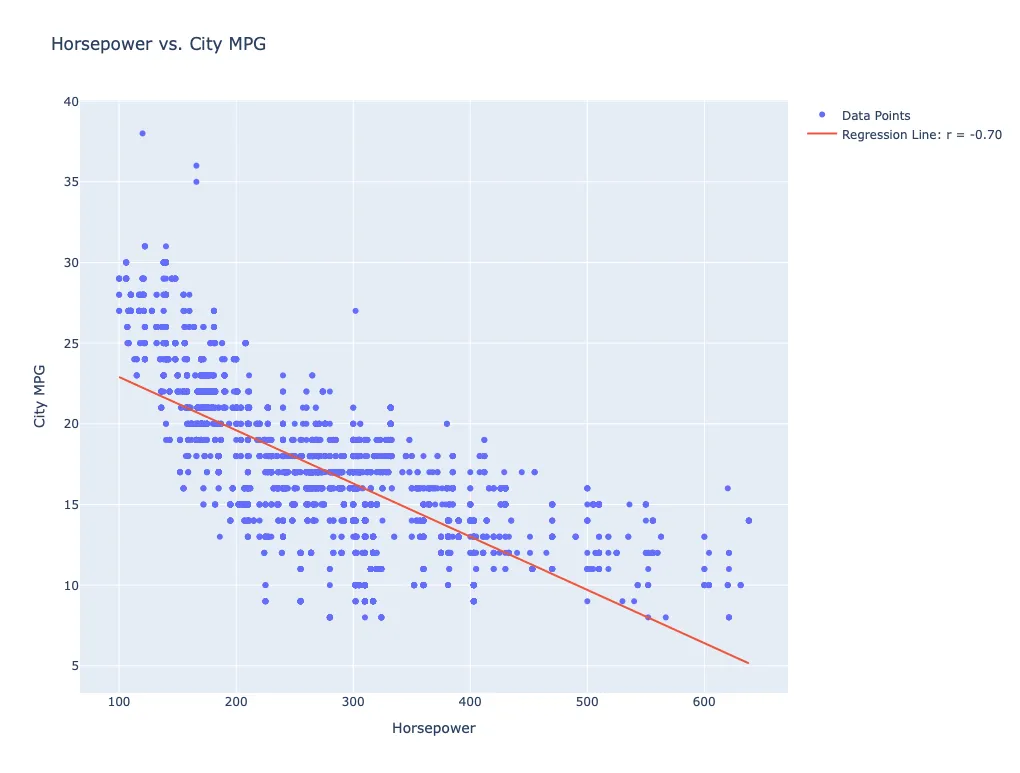
There’s a strong negative correlation (r = -0.70) between horsepower and city MPG. Translation - vehicles with higher horsepower tend to use more gas in urban driving conditions.
Highway MPG:
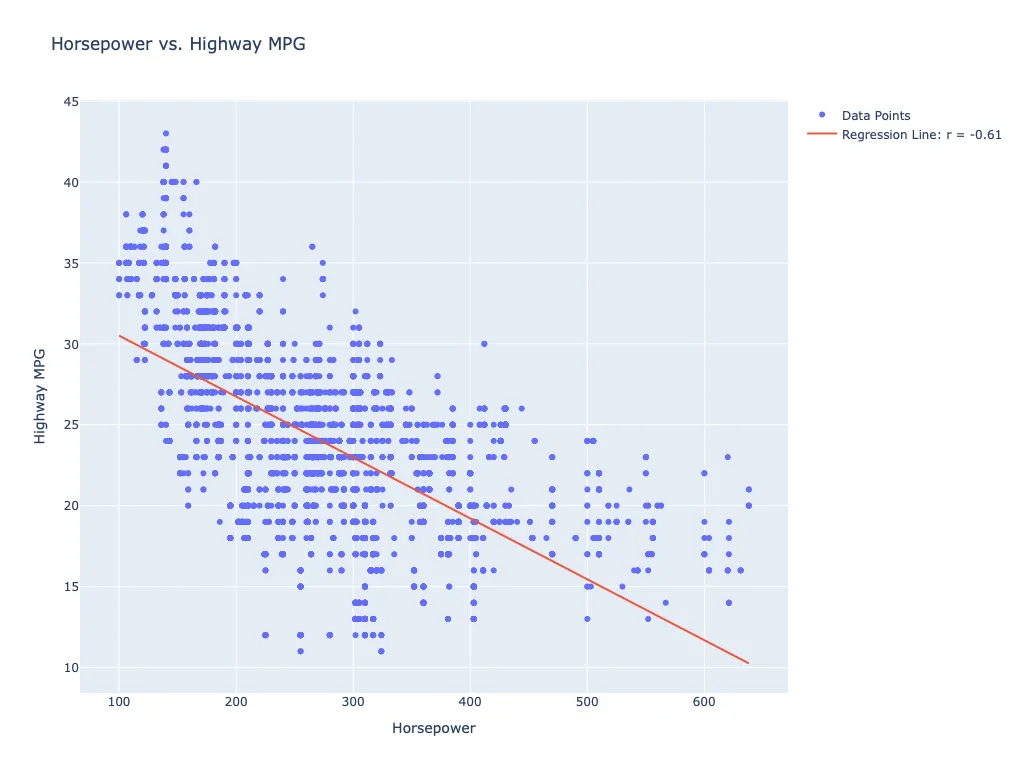
The negative relationship between higher horsepower and gas usage also holds for the highway (r = -0.61). However, it is more moderate compared to the urban environment. So, while higher horsepower negatively affects fuel efficiency on the highway too, it may not be as big of a deal as in the city.
Torque vs. Fuel Efficiency
Now let’s talk about torque.
City MPG:
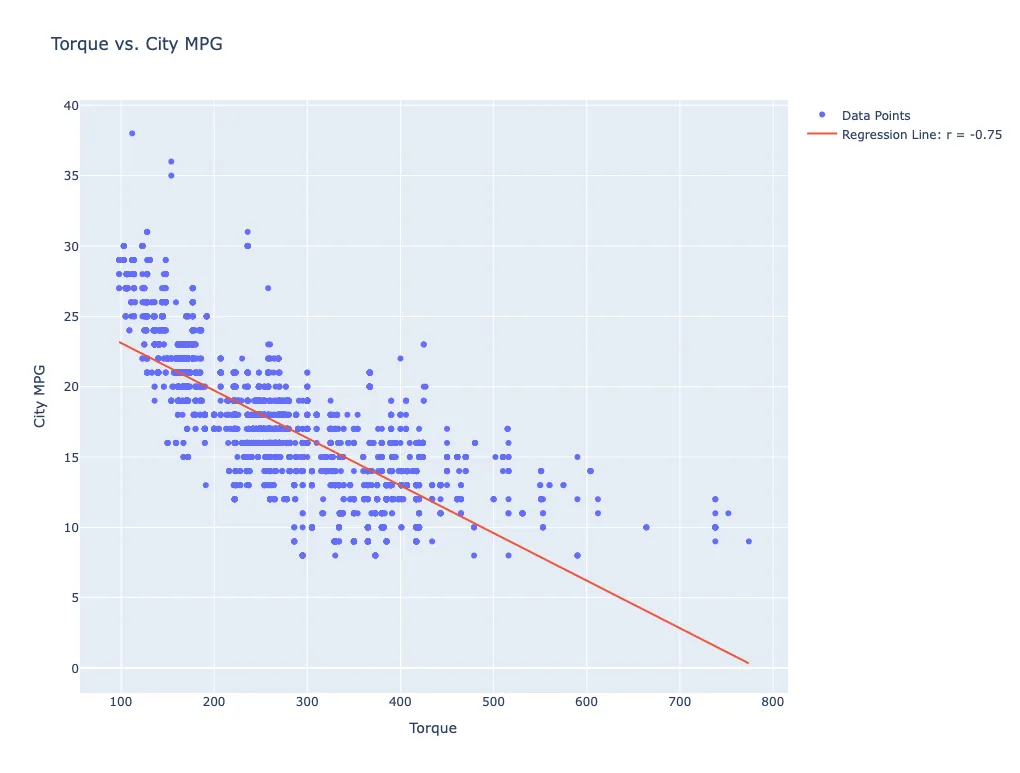
Torque shows a strong negative correlation with city MPG (r = -0.75). Higher torque means lower fuel efficiency in stop-and-go traffic.
Highway MPG:
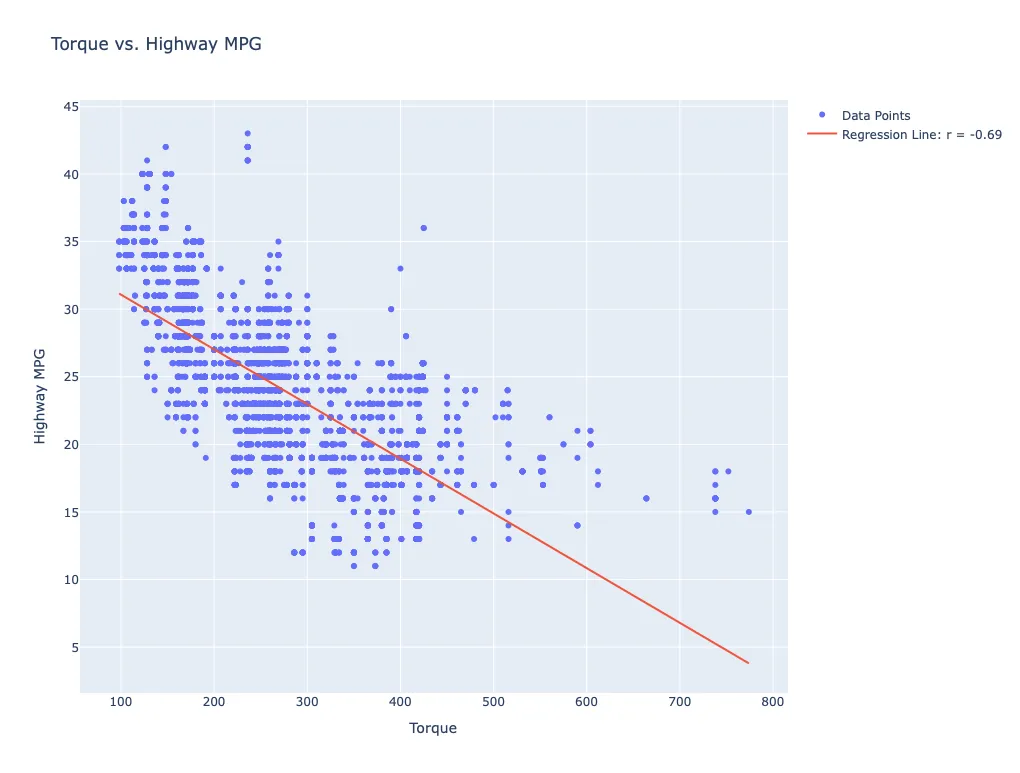 On the highway, the negative correlation (
On the highway, the negative correlation (r = -0.69) holds but is less dramatic than in city driving.
Bottom Line
Power vs. Fuel Efficiency Trade-Off: Higher horsepower and torque will usually mean lower fuel efficiency, especially in city driving where you constantly start-and-stop. On the highway, where you maintain steady speeds, the impact is less severe. So, while there is a trade-off between power and efficiency, the environment where you usually drive in can make a difference.
4. Transmission Type and Fuel Efficiency
Manual vs. Automatic
You’ve probably heard that manual transmissions are more fuel-efficient than auto ones. Is that still true today?
The preliminary analysis says yes. It shows that manual transmissions outperform auto vehicles in both city and highway environments:
| Transmission Type | City MPG | Highway MPG |
|---|---|---|
| Manual | 20.2 average (min: 11, max: 38, stddev: 4.4) | 27.9 average (min: 17, max: 43, stddev: 5.1) |
| Automatic | 16.5 average (min: 8, max: 36, stddev: 4.2) | 23.0 average (min: 11, max: 41, stddev: 5.6) |
On average, manual transmissions deliver about 20% higher MPG vs automatic transmissions in both city (+4 MPG) and highway (+5 MPG) conditions.
To see if this gap has persisted over time, we plotted MPG from 2009 to 2012 by transmission type:
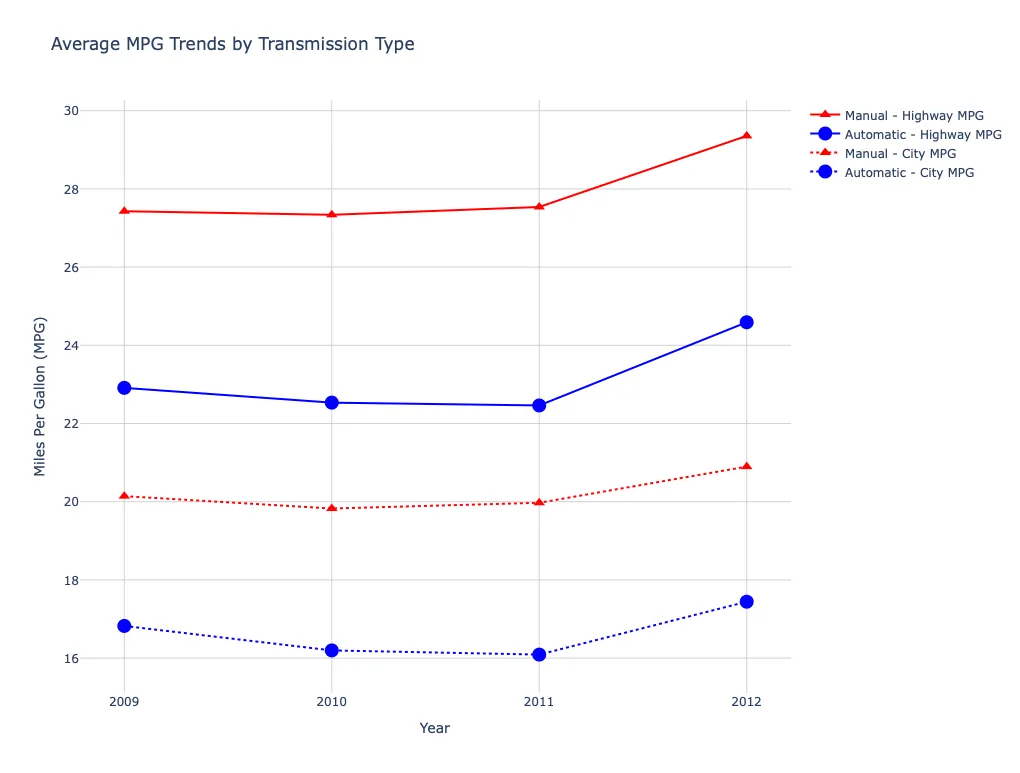
It showed that manual vehicles consistently beat auto ones every year, and the gap has persisted over time.
Statistical Significance of the Differences
We ran t-tests (assumed normality, robust to unequal variances and sample sizes) to see if the differences were statistically significant:
City MPG:
- t-statistic: -25.2
- p-value: 2.7 × 10^-19 (less than threshold of 0.05)
Highway MPG:
- t-statistic: -28.0
- p-value: 3.6 × 10^-145 (also less than threshold of 0.05)
As the p-values are so small, it is statistically significant that manual transmissions offer superior fuel efficiency compared with auto ones across both driving conditions.
Bottom Line
Manual transmissions still hold the edge in fuel efficiency. While auto transmissions are convenient, if you’re looking to save on gas, a manual vehicle might be the way to go.
5. Conclusion
Key Takeaways for Buyers
Our deep dive shows that horsepower, torque, and transmission type have moderate-strong predictive effects on fuel efficiency. So, what does this mean when you’re shopping for your next vehicle?
Horsepower and Torque: Bigger isn’t always better. High horsepower and torque predict more gas station stops, especially with lots of city driving. If you drive mostly around the city centre, consider a vehicle with more moderate power. Do you really need all that oomph when you’re stuck in traffic?Transmission Type: Manual vehicles still lead in fuel efficiency, ~20% better MPG than auto ones. If you don’t mind shifting gears yourself, you will likely save money at the pump.
Acknowledging the Limitations
Correlation vs. causation: Just because higher horsepower correlates with lower MPG doesn’t mean one directly causes the other. Other factors like vehicle weight, aerodynamics, and even driving style can also play a part.Statistical stuff: The t-test used assumes certain conditions (like normal distribution). To be more confident of the results, we can first check how strongly the assumptions used in the t-test hold.
Choose a Vehicle That Suits Your Lifestyle
Ultimately, choosing the right vehicle is really about finding the balance that works for you. Whether you’re after horsepower, convenience, better gas mileage, or top-notch safety, knowing what you want will help you pick a good match. Since buying a vehicle is a big purchase, take your time to ensure it aligns with both your lifestyle and budget.
Further Reading:
- Horsepower vs. Torque: What’s the Difference?
- What Is Transmission In A Car?
- EPA Fuel Economy Data: Download and explore the latest raw data